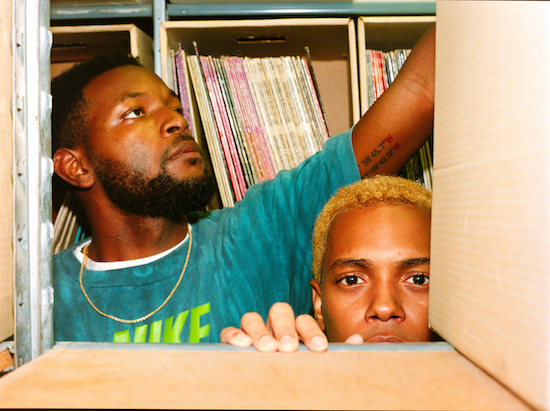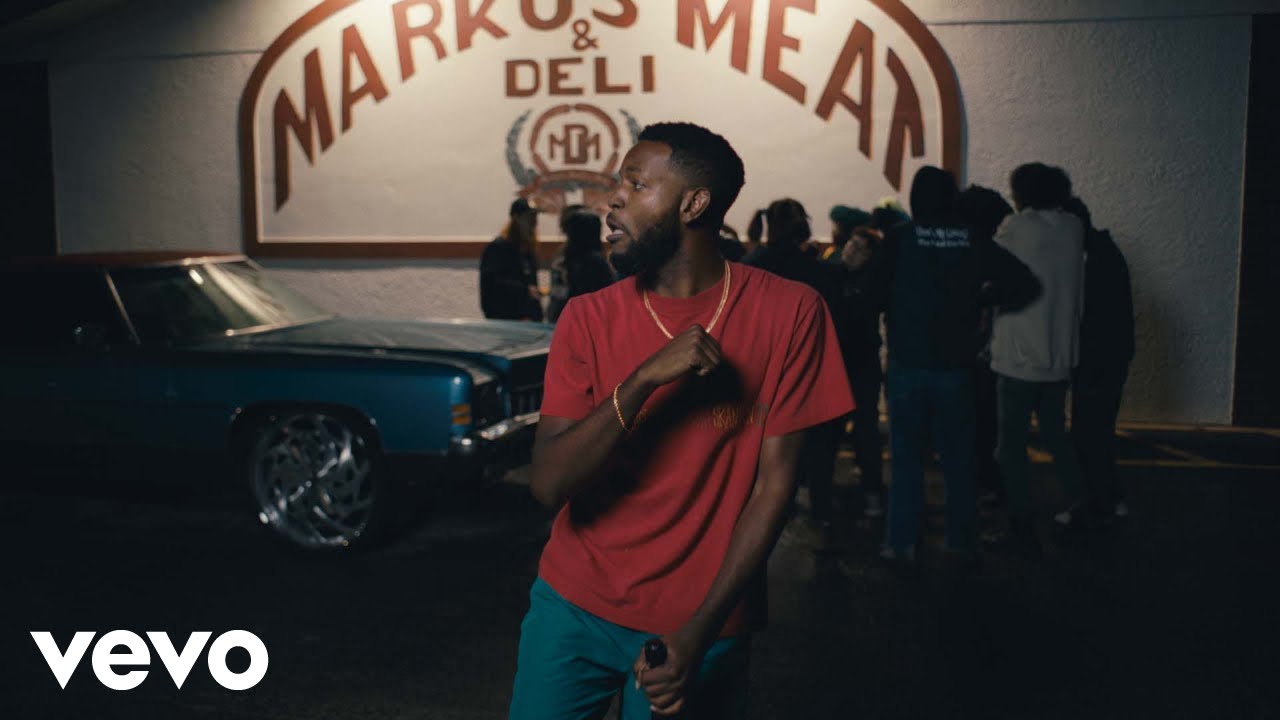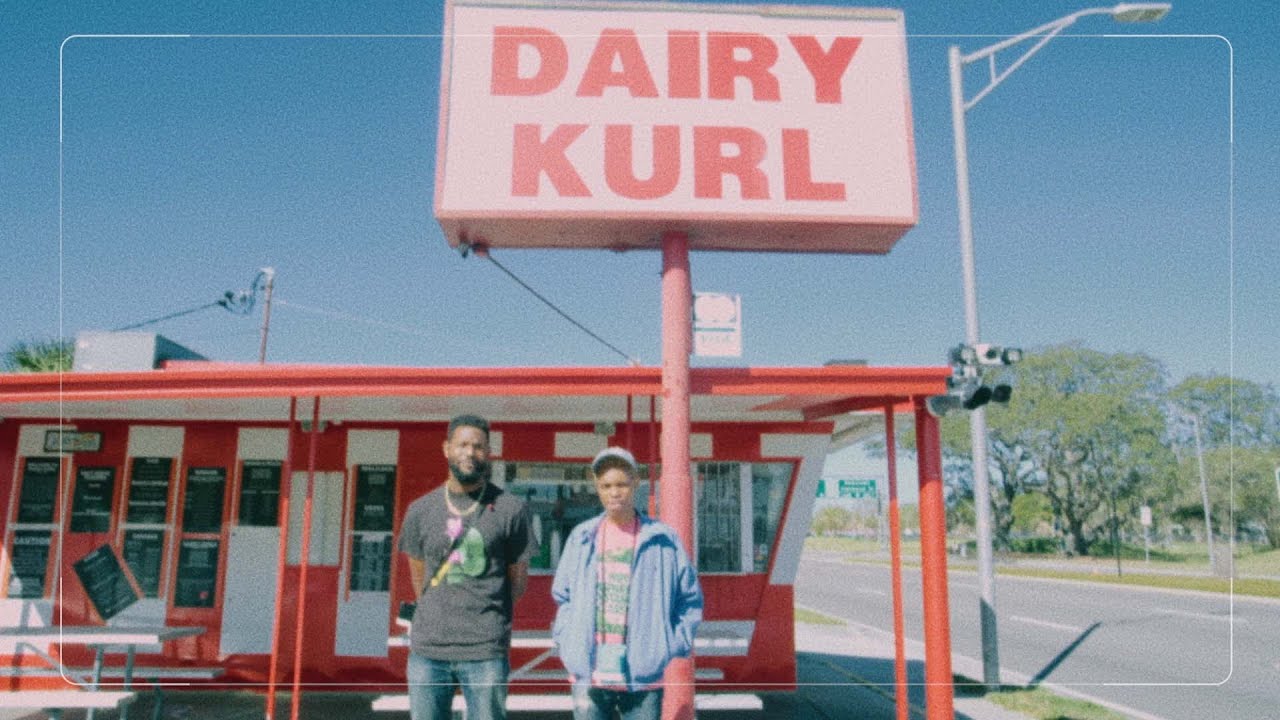They Hate Change portraits by Tyree Anderson
“We’ve made a dope record, a classic record, and we’re willing to stand by that,” says Vonne, one half of maverick Tampa Bay hip hop duo They Hate Change, towards the end of our interview. Their genre (and really, few rap artists sit so restlessly within their pigeonhole as this pair) might have form for boasting and braggadocio, but They Hate Change don’t deal in hollow swagger.
“I’m excited for people to hear our new album, Finally New,” they continue, “because I sense an energy from certain people and outlets that we’re bluffing, that our record label’s press releases are bluffing… We’re listeners too, we know the industry spends a lot of money to convince you an artist is something they’re not, a lot of fronting. The PR machine is telling you that we’re cutting edge, and we understand people have been told that lie before…”
They pause for a second, then begin again, earnestly, but grinning. “I’m excited for people to hear it and then say, ‘Naw, it’s real, whatever they said they are, they really are, they really doing it.’ Because this record is a little hit of Visine, to help you see a little bit clearer. Now you see what’s real. Now you see what ‘real’ looks like. Go find the stuff that’s like this. Because there’s more of it out there. It’s not just us.”
As campaign stump speeches go, it’s pretty impressive. And, yes – spoiler alert – the noise, the carnival of ideas, the sheer fearless chutzpah of Finally New is everything the duo claim it is. “Bleeding-edge new sounds!” barks Dre, Vonne’s compadre, hammily parodying the kind of OTT PR copy Vonne’s talking about, but also doing a fine job of summing up They Hate Change’s sound. In classic hip hop tradition, those “bleeding-edge new sounds” are lifted from elsewhere and radically recontextualised. Finally New’s thirteen tracks cut, paste, layer and ricochet between a dizzying array of styles, genres, microgenres and moments, many unexpected. Listen close, and you’ll hear the rattlesnake pulse of trap, the poise of footwork, the adrenalised rush of drum & bass, the high-sheen synthery of sophistopop, the carnal throb of bass music, and much more besides.
“Both of us have a crate-digger-y mentality,” admits Vonne. Their curiosity is inexhaustible. “We’ve always been super-nerdy, we get super in-depth on everything.” Their knowledge of music scenes arcane and mainstream borders on the encyclopaedic, but they go deep, and their passion is no pose – when I reveal that I’m Zooming from Tottenham, they immediately bellow shout-outs to long-defunct Tottenham grime cartel Meridian Crew. They have a hunger for the shock of the new, for the energy of a scene, for the kinetic thrill of shared creativity.
“We’re musical omnivores and scene participants,” Vonne says – they talk the most of the pair, but the partnership feels keenly, beneficially balanced. “When you’re in a scene and things aren’t happening the way you want them to, but you know about scenes in other cities and other eras that inspire you… We just constantly push for things to be like those scenes. In our scene, we’re going to parties and stuff, and it was the same DJs playing the same remixes, over and over. But we started DJing and we were like, ‘Nobody here plays footwork – nobody in this damned city even knows what footwork is – so we’re coming out and we’re playing hella footwork tracks, because I know everyone’s gonna be into this. The DNA of it matches up so well with what this city is about, and you’re all gonna fuck with it.’ And we do, and everyone is like, ‘This is crazy!’ And it’s just because we love the music, we wanted to hear it out, and we felt everyone else would love it too.”
Tampa Bay is hardly New York, or Atlanta, or Los Angeles – on ‘Blatant Localism’, one of Finally New’s standout tracks, the duo refer to themselves as “that rag-tag band from the no-man’s land”. But it’s home, where the duo first met, aged 15, shortly after Dre moved into the apartment complex where Vonne lived. “I walked up on him and tried to sell him some weed,” Vonne grins. “But we ended up becoming friends, hanging out, playing basketball, like teenagers do.” Vonne was already making music and playing shows; it was the era of Myspace, the internet was still a little bit ‘Wild West’, and anything seemed possible.
“You could put up some music on a Monday, and probably have a show by Saturday,” they say. “It allowed a lot of things to thrive. You’d find yourself interconnected to lots of people, and it wasn’t a huge leap for someone who’s a show promoter, who needs to put together a bill of artists every week, to come across your music and offer you a gig. And they’re just trying to meet a quota, to keep their club-night booked up. But it results in some crazy shit happening, and that booker sees all your friends make weird shit too and starts booking them. And soon, you and all your weirdo friends are a scene.”
By the time they met Dre, that Myspace scene had died away, and Vonne was making music mostly on their own. “I started showing Dre some stuff I was working on, and he had great input,” says Vonne. “Our connection was instant – it was clear we should be working together. We’re two sides of the same coin, and that makes our production work stronger. I’ll go crazier, lean more towards our wild, experimental side, while Dre knows how to tame that and turn it into stuff people would actually listen to, how to move stuff around and carve out space for us on the track.”

A key early reference point for the pair was Journey To The Fifth Echelon, the second album by Odd Future affiliates The Jet Age Of Tomorrow, AKA Matt Martians and Pyramid Vritra. “That blew my mind,” says Dre, “and opened the door to the idea that something could have a groove, have that hip hop aspect, and still have all kinds of crazy synth layers piled on top. We’d try to figure out how you could make a track with 23 different sounds on it that didn’t sound all clustered, playing around with science and space, so everything worked and made some kind of sense.” That love of drawing art from chaos endures. “Nowadays, we’ll be in the studio and it’ll just sound like noise for 45 minutes or so. And then, suddenly, it’s like, ‘Oh my god, this is incredible!’ We don’t even speak now, we communicate with looks. And if a song doesn’t make us smile, you won’t hear it. Every track is a result of that moment where we just bust out laughing, like, ‘Yo, this is crazy!’”
They Hate Change make dense music, thick with namechecks and shout-outs and esoteric references. “It’s always been important to us to have a sense of a personal canon,” Vonne explains. “There are things so embedded in us we don’t even have to think about them, that are part of our DNA.” Keen ears will hear repurposed lines from hip hop classics and hidden gems alike; score 10 points for recognising a bar from Jay-Z’s ‘Kingdom Come’ on ‘1000 Horses’, go straight to the top of the class if you recognise ‘Blatant Localism’ riffing on the hook from ‘Swing’ by 90s Bronx duo Camp Lo. “We’ll be hanging out and Dre might do a voice like [Camp Lo MC] Sonny Cheeba. Everything becomes an inside joke at some point. Every time we reference something on the album, it’s like we’re looking to each other and laughing.”
They began self-releasing cassettes and CD-Rs in 2015, which they sold at shows, and appearing on mixtapes and compilations. You can still check out this juvenilia online – “We love artists who don’t hide from their past,” Vonne says – but there’s very much a sense that Finally New is where the They Hate Change story properly begins. There’s a confidence and a focus here only hinted at on the earlier releases, which were very much about taking risks on wild experiments. Finally New is also wild and experimental, for sure, but it’s a deeply considered, intentional work, and Dre and Vonne have put a lot of graft into its creation, with no note wasted.
Take ‘Reversible Keys’, one of the album’s most ambitious tracks, featuring a guest appearance by formative influence Vritra. Across a handful of minutes, it shifts like a sandstorm from deep dub to exotic synthscape, underpinned by rattling, rib-shaking drum & bass drops. Its inspired collision of genres and influences was no accident. “We love prog and prog-adjacent stuff,” says Vonne. “We’ve always wanted to create suites of music. We wanted to fill the room, to build this wall of sound – heavy bass, and lush 80s keys. I don’t want to act like we’re drum & bass gods, but that is an ill track.”
Elsewhere, the duo refine their lyrical attack, focusing ideas toyed with on earlier releases. “I’ve written a lot of sad gender identity songs in the past,” laughs Vonne, who identifies as gender fluid. One such track – ‘Opposite Side Of A Bad Day’ off 2018’s Now, And Never Again – saw Vonne snarl, “Don’t take no shit from no cisgender prick / or no white feminist who sees me as the enemy / and can’t get a grip on the basics of identity / so seeing me in drag is a god-damned obscenity”. The mood on Finally New is very different, however. “At a certain point I felt like I didn’t want to write sad songs about my gender fluidity, because I don’t want to be sad about it – it is not a thing that is sad,” they explain. “And I shouldn’t be sad about it, you know? I’m going to talk about it in a very real way, and that doesn’t just mean being sad about it. Some days I’m really charged-up, some days I’m really feeling myself, just like everybody else. And some days I might feel a little bit lower, just because, but some days I got a ‘S’ up on my chest, like I say on ‘Some Days I Hate My Voice’. It’s like, Yo, let me talk my shit right. On ‘X-ray Spex’, I say ‘Fenty all on my face, vintage jeans on my waist’, talking about my makeup brand of choice. It’s not going on this long spiel about gender expression, or femininity, or whatever. I put it in there like a flex, like any other flex.”
The restlessness of Finally New is its secret weapon; the album is a shapeshifter, changing form every time you think you have a handle on it. And the duo are rightly proud of their work, but this seems less an act of ego than an offshoot of the love for music that’s powered them this far. “All we want to do is share what we’ve created or share what we’re interested in,” says Vonne. “Like, ‘Yo, have you ever heard this before? Do you know about UK Garage? Not that we’re experts, but let me play this track for you and see if your mind gets blown…’ If we keep making music like this, we could be really legendary and remain underground, or we could shift and cause a wave that shoots us up to the mainstream.”
Vonne and Dre sound as though either option would be copacetic for them. To be honest, as long as They Hate Change’s unpredictable, sui generis, quicksilver noise continues broadcasting from Tampa Bay, it will be all good.
Finally New is out digitally on Friday and physically on 3 June




